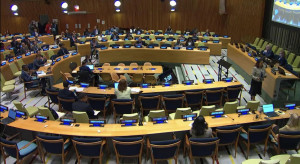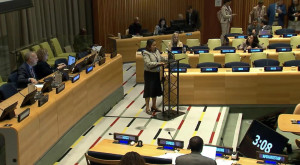During the High-Level Plenary Meeting on the existential threats caused by sea level rise, held on September 25th, 2024, in New York, Milena Maria da Costa Rangel, Vice Minister for ASEAN Affairs, highlighted the severe consequences that the phenomenon has caused in small island nations and coastal areas around the world. On behalf of the Government of Timor-Leste, the Vice-Minister warned of the concrete impacts on the country, namely the destruction of infrastructure and threats to coastal communities. 
“Rising sea levels have posed a significant threat to the lives and livelihoods of millions of people around the world”, said the Vice Minister. “In the case of Timor-Leste, our coastal infrastructure, coastal communities and towns have been threatened, and there has already been real loss and damage due to this sea level rise”.
The Vice Minister also emphasised that “the right to survival of many islanders has become uncertain”, with alarming predictions about the possible loss of small island nations. She, therefore, reinforced the call for global action, emphasising that efforts to mitigate greenhouse gas emissions are the only way to tackle rising sea levels. 
Developed countries, according to the Vice Minister, “must lead mitigation actions” following their obligations under the United Nations Framework Convention on Climate Change (UNFCCC) and the Paris Agreement. “The least emitting countries must also contribute to the collective effort by opting for a low-carbon development path, taking into account different national circumstances, poverty eradication and sustainable development”, she added. 
The Vice Minister also emphasised the urgent need for international cooperation to strengthen adaptation measures, particularly for Small Island Developing States (SIDS) and other low-lying areas, to establish resilience in the face of the threats posed by rising sea levels. She also argued that “developed countries should fulfil their obligations under the UNFCCC and the Paris Agreement to provide financial support to developing countries to enable adaptation and mitigation actions, increase resilience and respond to losses and damages caused by the impacts of sea level rise, especially in the case of Least Developed Countries (LDCs) and SIDS”.
During her speech, Milena Maria da Costa Rangel also announced the conclusion of Timor-Leste’s ratification of the Treaty on the Conservation and Sustainable Use of Marine Biodiversity in Areas Beyond National Jurisdiction (BBNJ), which she considered “a significant milestone in the conservation and sustainable management of marine resources in the face of climate change and ocean degradation. Timor-Leste realises that the health of our oceans is essential for our survival”, she said.